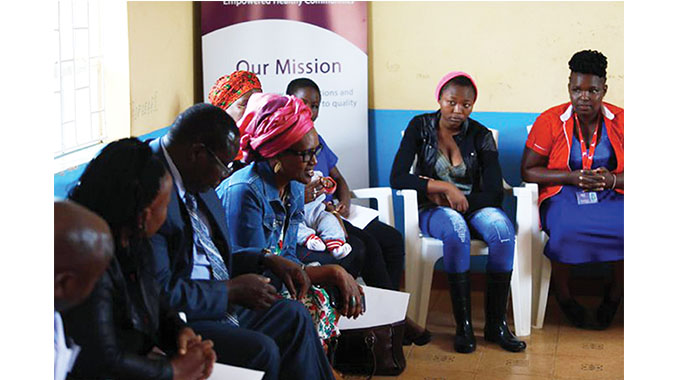Contraception not prioritised in many health facilities

Shamiso Chigonde
For the past six months the internet has been flooded with news about the novel coronavirus.
A lot of activities in the health sector have been channelled towards preventing and containing spread of the virus. In Zimbabwe, the official sites and social media pages of the Ministry of Health and Child Care and Ministry of Information, Publicity and Broadcasting Services are full of Covid-19 related posts.
Other important health issues like contraception seem to be neglected.
“Nothing can stop reggae” is a popular chant drawn from one of the late musician, Lucky Dube’s songs and in street lingo this means no amount of problems or stress can stop one from having sex. Indeed, this is true as threat of the pandemic is not stopping people from allowing their bodies the pleasures they have always enjoyed, raising the chances of spread of sexually transmitted infections (STIs) including HIV and dangers of unplanned pregnancies due to lack of proper contraception and information.
In Zimbabwe where provision of various methods of contraception is already a problem, such an issue will lead to greater effects in future.
Since time immemorial, women have been blamed for failure to conceive if they are in a childless marriage, the same happens when there is an unplanned pregnancy. It is deemed solely the woman’s duty to make sure she is on some form of contraception in order to avoid pregnancy.
With the current economic situation in Zimbabwe, the best and affordable option would be to access this service at government hospitals and clinics.
At local clinics like Mandava in Zvishavane and other small poly clinics, nurses said they give health lessons to women and pregnant mothers every morning but their efforts lie to waste due to lack of resources.
A nurse at one of the local clinics said: “Every morning before we start serving patients, we educate women on contraception and also ask them to contribute. Right now since contraception has not been regarded as essential during this Covid era, the attendance is generally low.
“On top of that, currently the clinic only has the pill; there are no injectable contraceptives like depo provera or implants. Though more women prefer the pill to other methods, there are some who get side effects from it especially those with hypertension. Lack of other means of contraception puts them at risk of unwanted pregnancies.
“Besides, the pill alone has its own risks, poor adherence can still increase the risk of pregnancy.”
Condoms are also available but are rarely listed as part of the options as most women do not opt for them, though they are the only type of contraception that prevent pregnancy, spread of STIs and help lower the risk of cervical cancer.
According to the nurse, it is usually sex workers that come and get them. Though the condom is readily available, it comes with its own consequences, as explained by Musasa Project’s Sharon Matingwina and Spiwe Sipati a villager in Mhondongori.
“It is interesting to note the connection between Gender-Based Violence (GBV) and Sexual and Reproductive Health. Women in abusive relationships are not able to negotiate for safer sex. In fact, we receive a lot of the cases of domestic violence that are linked to family planning and use of condoms,” said Ms Matingwina.
“For us, we grew up knowing that condoms are used by men when cheating on their wives. Many women have tried raising the issue of condom use in the family and they ended up wounded after being beaten by their husbands. It is actually a sin to even know how a condom is used. Your relatives will be told about your loose morals, you will be humiliated. Your husband will ask you where you learnt how to use a condom; they will blame you for promiscuity and beat you up until you regret it.”
The problem does not end with older women only, the fact that girls and young women indulge in sexual activities prematurely is undeniable. How many adolescents walk in to a clinic or hospital seeking information on contraception, without fear of being judged by the older generation or nursing staff? A youth friendly approach is needed for youths to receive services which are well packaged and suited for them.
Organisations like Bethany Project have tailor-made programs that cater for both adolescents and other women. The Covid-19 pandemic has affected their operations, however.
Bethany’s Project Officer Tatenda Rukanda said the lockdown has had an impact on them as an organization and on women they assist as they no longer have enough access to offer them information as far as sexual and reproductive health is concerned.
“Girls and young women have challenges in accessing health services. There was over emphasis of Covid-19 which resulted in other issues being over shadowed. Lack of proper sanitary wear to use is also another issue. Remember the lockdown was announced and not many people were able to get into town to buy all the goods they wanted. We were also not able to sort pads for them like we always do. We usually conduct door to door awareness raising on HIV and Aids but Covid-19 has disrupted that because the strategy puts everyone at risk.
“Young women are not able to meet and conduct their sessions as usual on contraceptives and sexual violence. We have now shifted to online programming but still not all beneficiaries, especially those in the rural areas, can easily access information due to the fact that just a few of them own smart phones. As a result they miss out on the online campaigns. The burden of unpaid care work has also risen and women do not have time even to listen to the radio or TV which are some of the sources of information available for them.”
Population Services Zimbabwe, which specialises in providing pregnancy, contraception and family planning services in the country is still operating during the Covid-19 era but their services provision is now limited since they cannot conduct mobile HIV testing, educative roadshows or outreach campaigns.
According to the United Nations Population Fund (UNFPA) 47 million women around the world could lose access to modern contraceptives due to the impact of the coronavirus pandemic. Lack of information and unavailability of varied contraceptive methods hinders women from making informed decisions about their future. There is also a list of effects of lack of contraception ranging from unplanned pregnancies, STIs, illegal abortions and infanticide.












Comments